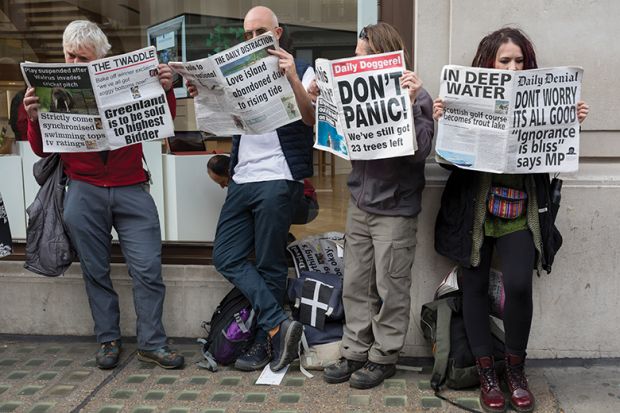Agonising about the place of media studies is a recurring theme of 2019. Only a few weeks ago, this esteemed publication consulted a number of scholars about the role of the subject, under a headline that asked if “media studies is about to go viral”. The author of this book was one of the respondents to that survey. Meanwhile, the other half of his title is occupying bookshelves at a galloping pace. One can barely count the number of volumes this past year devoted to the dilemmas and horrors posed by fake news, analysed from multiple perspectives. Readers might wonder if there is room for yet one more and what new insights it will have to offer on the topic, and particularly on ways of building resilience against the virus.
The angle taken here is that the teaching of media studies provides a vital component in alerting young people to the danger of fake news. The case for the defence of media studies is a well-worn battleground with esteemed scholars such as the media/communications department at Goldsmiths, University of London on one side lined up against the “Mickey Mouse” brigade on the other. The disparaging of media studies is endorsed by voices such as John Humphrys and the Daily Mail. Nevertheless, media studies has slowly reached a position where it is widely accepted on the curriculum as a subject that merits study at secondary level. Julian McDougall is arguing that, now that it has gained respectability, we should insist that media studies becomes compulsory. (Generations ago, interestingly, English was regarded as a lightweight subject that had to fight its way on to the curriculum; now it is without controversy accepted as part of a core curriculum.)
Earlier this year, a similar argument was developed in The Media Education Manifesto by another media scholar, David Buckingham. That was a rather more tightly focused argument for the value of teaching media studies to all children, distinguishing between “media literacy” as a set of tools and media education as an in-depth opportunity to systematically analyse media power and influence. Julian McDougall, on the other hand, has taken a rather rambling approach: he has travelled the world from event to event (courtesy of the US Embassy among others) discussing media and misinformation. Along the way, he has interviewed a variety of seminar/conference participants – some of them well known and including practitioners and academics alike. The transcripts of those interviews form the core of this book. In addition to their views on topics such as misinformation or digital literacy, we are also offered a number of “toolkits” as resources and innovative strategies to support media educators.
There are some interesting explanations, and many of the insights offered by interviewees such as a Buzzfeed journalist are genuinely illuminating. Yet overall, I found the book too diffuse and fragmented, reading sometimes like musings in a travel journal. It makes an interesting companion for a media studies teacher looking for resources, but it is overshadowed in a crowded field by many other excellent and well-crafted books that seek to describe our perilous contemporary media ecology.
Suzanne Franks is a professor of journalism at City, University of London and the author of Women and Journalism (2013).
Fake News vs Media Studies
By Julian McDougall
Palgrave Macmillan, 274pp, £22.99
ISBN 9783030272197
Published 22 November 2019
Register to continue
Why register?
- Registration is free and only takes a moment
- Once registered, you can read 3 articles a month
- Sign up for our newsletter
Subscribe
Or subscribe for unlimited access to:
- Unlimited access to news, views, insights & reviews
- Digital editions
- Digital access to THE’s university and college rankings analysis
Already registered or a current subscriber?






